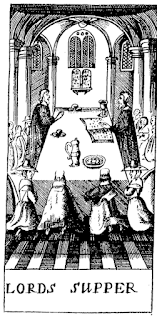Archbishop Laud or Mr. Keble?
But it is not Dr. Pusey alone who has thus departed from the mode of speaking used by our forefathers. We find the same thing in all the rest of his school. Mr. Keble, for example, wishing to make some point out of Bertram's [i.e. Ratramnus] book, is met by the troublesome fact that Bishop Ridley found that author so - Calvinistic, I suppose we are to call it - that he translated it. How is he to get over it? By a simple assertion: "Ridley, whose sentiments on Christ's Presence in the Eucharist are known to have differed materially from Calvin's." Known by whom? Certainly not by Laud. And yet he was a man versed in the writings of the Anglican divines who went before him ... we find that he shuns not to say that "Calvin comes no whit short of these [i.e. Ridley and Cranmer] against the calumny of Romanists on that behalf." In Laud's opinion, then, it was a Romanist calumny to say that there was material difference between Ridley and Calvin. The reader has his choice which of the two to believe, Archbishop Laud or Mr. Keble. I think, when he sees the way in which Mr. Keble deals with authorities, he will prefer crediting the Archbishop.
Groves provides the relevant extract from Laud's Conference with Fisher, in which Ridley is quoted to demonstrate how "the Learned Protestants in Queen Mary's days, did not deny, nay did maintain the Real presence":
Both you and I (saith he) agree in this: that in the Sacrament is the very true and natural Body and Blood of Christ, even that which was born of the Virgin Mary, which ascended into heaven, which sits on the right hand of God the Father, which shall come from thence to judge the quick and the dead. Onely we differ in modo, in the way and manner of being. We confess all one thing to be in the Sacrament, and dissent in the manner of being there. I confess Christ's natural Body to be in the Sacrament by spirit and grace, &c. You make a grosser kinde of being, inclosing a natural Body under the shape and form of Bread and Wine.
Laud - as Groves notes - goes on to identify this understanding of the Sacrament with Calvin, against Zwingli. Laud, in other words, places the Eucharistic theology of the Reformed Church of England alongside that of Calvin's "most true and Real presence". Also significant is Laud's quoting of Bishop Ridley, sharply contrasting with the increasingly explicit Tractarian rejection of the Reformers. It is this which brings us to the choice set forth by Groves: Archbishop Laud or Mr. Keble? The former is faithful to "the mode of speaking used by our forefathers" regarding the holy Sacrament. The latter is not.




Comments
Post a Comment